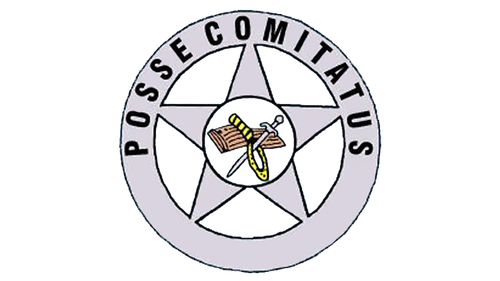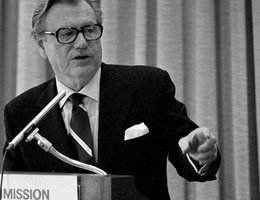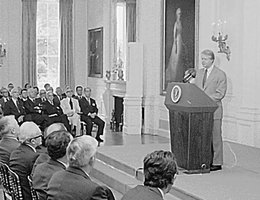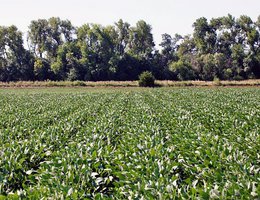

The Posse Comitatus was a right-wing extremist group that contended that the true intent of the country’s founders was to establish a Christian republic where the individual was sovereign, and that the Republic’s first duty was to promote, safeguard, and protect the Christian faith. They saw farmers as the victims of a Jewish-led, communist-supported conspiracy that had infiltrated the government. They thought the conspiracy would rob the farmer of his land through manipulation of land values, grain prices and credit. Once this conspiratorial group controlled the land, Posse Comitatus thought it would control the food supply. Police in Nebraska were concerned about the Posse’s influence during the farm crisis.
Henry L. Beach founded the Posse in 1969 in Portland, Oregon. Beach was a retired dry cleaner and one-time member of the Silver Shirts, a Nazi-inspired organization that was established in America after Hitler rose to power in Germany.
The name is from Latin, meaning "power of the county". Specifically, the Posse believed there was no legitimate form of government above the county level, no higher law enforcement authority than the county sheriff. The Posse said that should the local sheriff fail to carry out the will of the county’s citizens — or should he allow state and federal officials to come into the county and impose illegal laws, regulations, or other government controls —
"He shall be removed by the Posse to the most populated intersection of streets in the township and at high noon be hung by the neck, the body remaining until sundown as an example to those who would subvert the law."
Under their extreme interpretation of the law, they believed that the income tax system was illegal. They contended the United States was a republic, which meant the individual was sovereign and the government had no power to enact laws that would "loot and plunder the wealth produced by the sovereign individual."

The group existed in obscurity until 1975 when the FBI learned of a possible assassination attempt against then Vice-President Nelson Rockefeller in Little Rock, Arkansas. Rockefeller was viewed by the Posse as one of the major "money czars". After an investigation, the FBI uncovered 75 Posse chapters in 23 states. Nebraska was one of the states with a chapter. The Posse had an obsession with secrecy, and it was difficult for the FBI to get accurate numbers. Generally, the organization appealed to people living in rural Midwest as the farm crisis worsened. The Posse saw the farm crisis as an opportunity to spread their message and create a white, Christian republic. The battle cry became:
"The farmers must prepare to defend their families and land with their lives, or surrender it all."
Members of the Posse Comitatus were involved in a shoot-out in Arkansas in 1983 that resulted in the deaths of two U.S. marshals. As a result of the Arkansas incident, the Nebraska State Patrol began an investigation and contacted gun dealers in the North Platte area to gauge possible Posse Comitatus activity. They found records of the sale of automatic weapons.
Special investigator Samuel Van Pelt also voiced his concerns about the growing "survivalist" mentality that appeared to exist in some sections of the farming community. He said that the writings of virtually all of the protest or survivalist organizations had one thing in common — anti-Semitic language. He said those groups also viewed the Trilateral Commission as the:
" . . . ultimate evil — Jewish bankers who are conspiring, they think, to take over the world and ruin their lives. They think the Trilateral Commission is trying to force farmers off the land through the banks and the Federal Deposit Insurance Corporation so it can control food production and the economy."


The Trilateral Commission was developed in the 1970s. David Rockefeller, Nelson’s youngest brother, was one of the principal founders. The organization includes a wide variety of prominent American political and business leaders such as Alan Greeenspan, Paul Volcker, former President Jimmy Carter, Vice-President Richard B. Cheney, and others. The basic objective of the organization is to bring about closer cooperation among Japan, Western Europe, and North America. It seeks to establish international cooperation to foster economic and political security throughout the world. Critics say it is an attempt by influential political and business leaders to create a one-world economic and political organization controlled by them.
Most farmers turned a deaf ear to the Posse Comitatus. Others were too busy to be bothered; they may have already worked over 16 hours that day and had no time left to listen to the Posse. However, some farmers did listen. Sure the message was crazy and didn’t seem to make much sense, but some farmers were desperate. They saw people on welfare eating well with the help of farmers’ tax dollars, while farmers groveled for food and were forced from their homes.
Some farmers believed the Posse Comitatus was really going to help them. These were desperate times, and desperate times called for desperate measures. After all, the institutions farmers believed in — the church, government, bank, and community — were telling them that the trouble they were in was of their own making. It was their fault they were losing their farms.
Van Pelt said he could understand how farmers might be drawn to groups like the Posse Comitatus. Most farmers were hard-working and conscientious people who are failing financially.
"It’s almost like a breakdown of the Puritan work ethic that you’ll succeed if you work hard, have good habits — don’t drink or smoke, and go to church."
Most farmers had done those things and were still failing without understanding understand why.
Then along comes someone telling the farmers that it was the fault of the Trilateral Commission made up of "Jews, Masons, and lawyers," Van Pelt said,
"It’s the exact same approach used in Germany 50 years ago when Hitler blamed the Jews for Germany’s problems."
Van Pelt said rural Americans who were drawn to such assertions were likely to have a survivalist mentality to start with. These people wanted to be totally independent of any outside forces. For these people, Van Pelt sympathized,
" . . . the bottom line is, your home is your fortress and castle, and you’d better be ready to defend it against the outside world."

Inflammatory statements were not limited to the survivalist groups. Even moderate groups, such as the National Farmers Union, felt farmers were the victims of attempts by government and big business leaders who were attempting to keep farm prices low so the general public could enjoy low food costs. Cy Carpenter, president of the National Farmers Union, said in December 1984 that there were striking parallels between the civil rights movement and farmers movement. He believed farmers had to assert their claims for economic justice to save the family farm. Carpenter said,
"Didn’t Martin Luther King tell them [African Americans] they had nothing to look forward to without a struggle? There it was social injustice they were struggling against and here it is economic injustice."

Carpenter said farmers were exploited because:
" . . . everyone in the food chain gains from forcing the prices lower at the farm level. The only market for the farmer is taking what he can get."
Carpenter said more farmers were quitting agriculture.
"The overall threat to our system of agriculture and our rural communities has never been as intense as it is now."
According to Carpenter, when farmers fail, the stability of rural communities — from businesses to hospitals to schools — is threatened.
"The solution is to establish an equitable position for farmers in the economy. The problem isn’t in production agriculture, it’s in the economic makeup of the country."